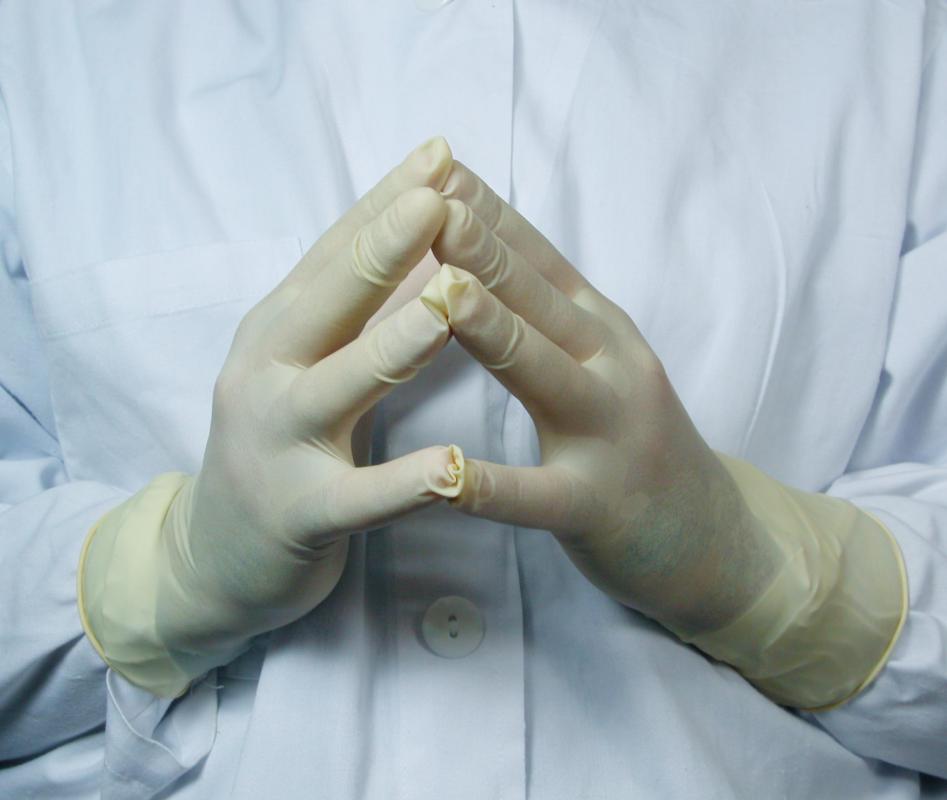At WiseGEEK, we're committed to delivering accurate, trustworthy information. Our expert-authored content is rigorously fact-checked and sourced from credible authorities. Discover how we uphold the highest standards in providing you with reliable knowledge.
What is a Surgical Wound Infection?
A surgical wound infection is the growth of bacteria, in the place where a person has had a recent surgical incision. This can be a dangerous infection because it may cause a related infection of the blood, sepsis, since the wound is open. Infections are surprisingly prevalent, with about half a million people in the US alone developing a wound infection after surgery.
There are some practices that help to minimize surgical wound infection, and these have to do with making sure that surgeries are performed in a sterile way. All people in an operating room rigorously scrub and wear protective clothing. The area that will be incised is cleaned and treated with antibacterial products. These precautions help prevent the introduction of bacteria during the surgery.

Not all surgeries are conducted in ideal circumstances, and in grave emergencies there might not be time to conduct fully sterile procedures. In other cases, protocol for surgery is simply not observed, a person could be so sick they have difficulty fighting infections, or aftercare is lacking and the infection develops later. Sometimes, it’s hard to tell what caused the invasion of bacteria. Hospitals are known hosts for a variety of opportunistic bacterial types, including the serious methicillin resistant staphylococcus aureus (MRSA), and even with everyone being careful, a surgical wound infection may develop.

The degree to which a surgical wound infection is problematic really depends on infectious agents and extent of infection. Patients are told to report any of the following symptoms: an incision reopening along the incision line, a peculiar or bad smell, a sensation of heat at the incision site, any evidence of pus, weeping or bleeding from the wound, red streaks leaving the wound, rash on or around the wound, fever, flu-like feelings, and extreme tiredness or fatigue. Failure for the wound to heal along an expected timeline may be another sign of surgical wound infection, and it’s important once out of the hospital to see doctors for any scheduled examinations so healing level can be assessed.

Equally important is following any guidelines for care at home, since not all infections occur in hospital settings. People should keep incisions covered for directed times, should not get them wet until authorized, and should change bandages or dressings on a recommended schedules. It’s also emphasized that if infection is suspected, the wound should remain covered, since it is does potentially pose an infection risk to others.

Doctors treat infections in several ways. Oral antibiotics can fight bacterial overload, but sometimes it can take some searching to find antibiotics to which specific bacterium are not resistant. If infection is severe, people may need intravenous antibiotic treatments and some people require re-hospitalization. Very severe infections may be treated with debridement, where infected tissue is removed from the surgical wound so that healthy tissue is left to fight bacteria and heal. In the most difficult cases, which are extremely rare, amputation of the infected area is considered.
AS FEATURED ON:
AS FEATURED ON:















Discussion Comments
@ocelot60- I think that most people underestimate the importance of getting plenty of rest and eating a balanced diet following surgery. Surgical procedures are stressful for the mind and body, so it takes a lot of rest and sleep to recover. Getting at least 8 hours of sleep at night and resting throughout the day for a few days after a minor procedure and for several weeks following major surgery will aid the healing process. Proper healing will also help to ward off infections.
Getting plenty of water, vitamins and minerals, and protein will also help keep the body healthy, which in turn helps to prevent infection. Anyone having surgery should talk to his or her doctor about the best diet to follow for a speedy recovery with no compications after surgery.
What are some other ways to ensure that you do not get a surgical wound infection once you are released from the hospital? I had a friend who followed all of her doctor's wound care instructions following surgery, and she still got an infection during the healing period.
Post your comments